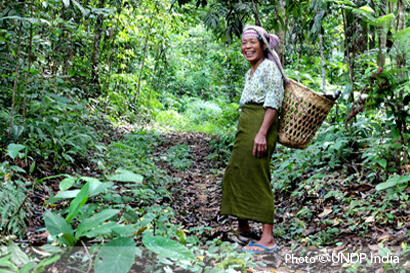Tagged: India
The Fear of Forcible Eviction: Deficiencies in India’s Forest Rights Act’s Recognition of Indigenous Land Rights
Land rights has been an ongoing issue in India for many years now, but there are some communities that end up being more vulnerable than others. This was made clear on February 13th, 2019, when the Supreme Court of India released an order for mass evictions of indigenous forest dwellers from forest areas for the goal of conserving these lands. Here, the conflict itself is not surprising because evictions has been a persistent issue throughout Indian history, but it is the degree of how many individuals would be impacted that made this news so surprising.
This order was later stayed for the purpose of asking states to provide more details on the steps of eviction due to the nearly one  to two million indigenous people who would be affected by the declaration. This order is significant for illustrating the deficiency in current legislation and also for shedding light on the consequences faced by vulnerable communities who live in fear of being forcibly evicted from lands that they live on, depend on, and survive on. This article will lay out the process and current critiques of the FRA, and further discuss the ongoing arguments for and against the mass eviction ordered in the February 13th decision.
to two million indigenous people who would be affected by the declaration. This order is significant for illustrating the deficiency in current legislation and also for shedding light on the consequences faced by vulnerable communities who live in fear of being forcibly evicted from lands that they live on, depend on, and survive on. This article will lay out the process and current critiques of the FRA, and further discuss the ongoing arguments for and against the mass eviction ordered in the February 13th decision.
Forest Rights Act of 2006
Enacted in 2006, the Scheduled Tribes and Other Traditional Forest Dwellers (Recognition of Forest Rights) Act (commonly referred to as the Forest Rights Act (FRA)) was intended to protect indigenous populations. The FRA sought to substantiate and recognize land claims of forest dwellers. The FRA brings two groupings of individuals within its purview:
- Forest dwelling Scheduled Tribes, which includes members of Scheduled Tribes who primarily reside and live off the land, and
- Other traditional forest dwellers, which includes anyone who can prove that they have resided on and lived off the land for “at least three generations.”
To obtain legal recognition of their land rights individuals must file a three stage claim.
- Stage 1: The first stage begins at the level of the Gram Sabha, which is generally a village assembly at which a person presents their claim to the land. At this assembly people are elected to the Forest Rights Committee, which investigates the claim and presents its findings to the village assembly. Acceptable forms of proof to support a land claim are governed by Rule 13 of the Comprehensive Tribal Rules.
- Stage 2: After the Forest Rights Committee presents findings to the village assembly, the second stage begins with the review of the claim by the Sub-Divisional Level Committee.
- Stage 3: Thereafter, the third stage is set at the District-Level Committee which determines the fate of the claim; either a claim will be accepted or rejected. If rejected, an appeals process is available to the claimant, but it is uncommon.
Despite being considered a step forward, the FRA’s deficiencies serve to negatively impact indigenous forest dwellers.
- Inexperience: First, there is the issue of inexperience with the legal system as this Act imposes a legal process that these groups may be unfamiliar with and therefore will find it more difficult to complete fully and accurately.
- Inaccessibility: Second, there is the issue of inaccessibility, because the Act imposes a standard form, but does not consider diversity (i.e. approximately 705 diverse ethnic groups that are legally recognized) and how such a form could be inaccessible to individuals not speaking the same language or who have different customs on resolving disputes.
- Impractical: Third, there is the issue of impractical standards. As the definition of the other traditional forest dwellers mentioned above indicates, part of the process of getting the land right recognition requires a claimant to present proof of residence in the forest area for at least three generations. The following two factors show how this is not a practical standard:
- First, having difficulty preserving documentation that dates so far back when living a nomadic way of life,
- Second, it be unlikely to have had an opportunity or need to compile such documentation beforehand.
- Inadequacy: Lastly, there is the issue of inadequacy, as this procedure is set up in a way that can be influenced by adverse interest groups who may have alternate plans for the forest areas that indigenous groups call home.
These deficiencies illustrate how complex the issue is, and how there are a number of structural issues that need to be resolved in order to provide the protection that these groups need.
Arguments For And Against Forced Evictions
The February 13th order is unclear on the forced eviction of indigenous groups. Those opposed to indigenous groups residing in forest lands claim that the current destruction of forest areas is attributable to indigenous dwellers whose practices and way of life prove to be harmful to these areas. Furthermore, opponents such as the conservationists are not entirely sold on the purpose the FRA serves in recognition of land rights.
Supporters of indigenous forest dwellers, however, characterize these dwellers as the forest’s guardians because their practices prove to be less harmful to the land. Having resided on the land for many generations, their history, culture, and practices are tied with the land in an inexplicable way, and so evictions can prove to be disastrous to these communities especially when they are executed through force.
There have been many incidents when forced evictions have been executed through use of force (i.e. threatening behavior, destruction of home, etc.). Such evictions are expected to have dire consequences for evicted individuals, but with communities as cohesive as indigenous groups the consequences are even more far reaching. Not only are they at risk of induced poverty and danger, but community and social life are broken down forever.
These consequences indicate a systemic and pervasive issue that requires resolution. The starting point for this is amending the FRA by making it simpler and stronger by addressing the deficiencies listed above. Only through amending this Act can real change begin to happen.
Note: This article is based on a paper originally submitted in the Environmental Justice class at BU Law.
 Nabaa Khan anticipates graduating from Boston University School of Law in May 2021.
Nabaa Khan anticipates graduating from Boston University School of Law in May 2021.



